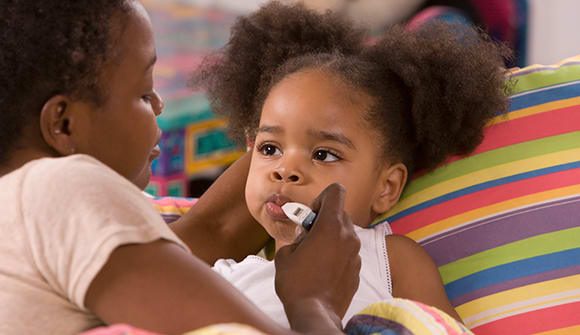Childhood obesity rates on the rise
How to help your child build healthy habits early.
Article Date:

One in 5 American children between ages 2 and 19 are overweight or obese, according to the Centers for Disease Control and Prevention. Obesity rates have been steadily climbing since 1999 and the disease impacts nearly 15 million children across the country.
Causes of obesity in children
Multiple factors can play a role when it comes to childhood obesity, according to Shawyntee Mayo, MD, MPH, a pediatric cardiologist and medical director of the Pediatric Preventive Cardiology Clinic at the C. Herman and Mary Virginia Terry Heart Institute at Wolfson Children’s Hospital.
“While genetics or medical conditions can impact your child’s weight, the most common cause of childhood obesity is an unhealthy diet, which can often lead to a sedentary lifestyle. Today, children have more screen time and less physical activity to burn calories,” Dr. Mayo said.
It’s not only the quantity of food that has changed in recent years, but also the quality, Dr. Mayo said.
“The quality of our food has shifted toward more processed, high-sugar foods and fast food as opposed to fresh and natural foods,” she said.
The earlier in life a child becomes obese, the sooner they may be affected by its associated health conditions: type 2 diabetes, high blood pressure, coronary artery disease, high cholesterol, osteoarthritis and sleep disorders.
“Studies have shown that changes in the coronary arteries begin in childhood. It’s never too early to be concerned about plaque formation, which is the accumulation of cholesterol, fat and calcium that can narrow the arteries,” Dr. Mayo said.
Mental impacts of childhood obesity
While the physical impact of obesity is well known, the mental effects can be just as serious.
“Along with bullying, childhood obesity can lead to sleeping disorders, anxiety, depression and overall low self-esteem,” Dr. Mayo said.
She builds personal connections with her patients to find out what motivates kids to lose weight. It starts with the question, “What does being healthy mean to you?” For most children, it’s not about avoiding diabetes or heart disease, but rather playing on the football team, running as fast as their friends or wearing their dream dress to prom.
“A child has an increased risk for obesity when at least one parent is obese. You can help set a good example and motivate your child by exercising with them and prioritizing healthy meals,” Dr. Mayo said. “Any improvements you make physically will also help lower the negative mental impact of obesity on a child.”
3 takeaways for a healthier lifestyle
1. Get moving. “Make time to move every day with your child,” Dr. Mayo said. “Go for a walk, jump rope, hula hoop or complete one of the many free exercise videos you can find online. Each day should incorporate some form of exercise.”
2. Turn off the TV. “Minimize screen time as much as possible, ideally no more than one hour each day,” she said.
3. Fresh is best. “The earlier the exposure to fresh food, the better,” said Dr. Mayo. “Avoid processed foods, which are usually lower in nutritional value and higher in fat and calories. I also think many parents don’t expose their children early enough to different foods. Doing so will help promote a varied palate and a healthy lifestyle.”
Your child's pediatrician can help with weight management
If you’d like help building healthy habits with your child, a Baptist Primary Care pediatrician can offer advice and guidance. To find the right provider for you and your family, call 904.202.4YOU (4698) or fill out the appointment request form. For more information about pediatric cardiology services from Wolfson Children's Terry Heart Institute, call 904.202.8550.



